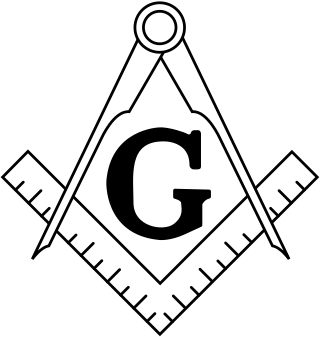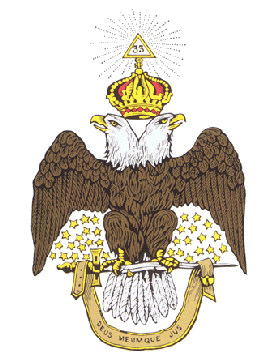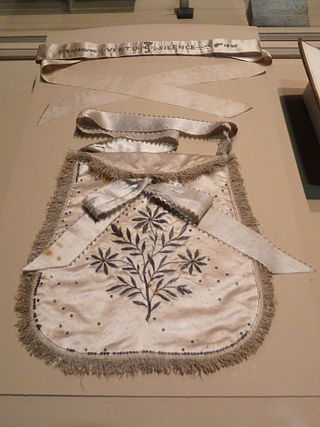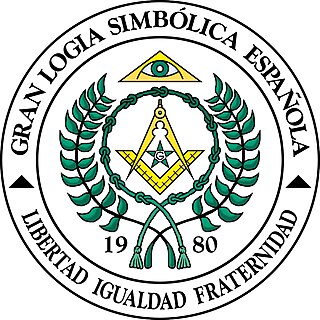
Freemasonry or Masonry refers to fraternal organisations that trace their origins to the local guilds of stonemasons that, from the end of the 14th century, regulated the qualifications of stonemasons and their interaction with authorities and clients. Modern Freemasonry broadly consists of two main recognition groups: Regular Freemasonry, which insists that a volume of scripture be open in a working lodge, that every member professes belief in a Supreme Being, that no women be admitted, and that the discussion of religion and politics do not take place within the lodge; and Continental Freemasonry, which consists of the jurisdictions that have removed some, or all, of these restrictions.

The Ancient and Accepted Scottish Rite of Freemasonry is a rite within the broader context of Freemasonry. It is the most widely practiced Rite in the world. In some parts of the world, and in the Droit Humain, it is a concordant body and oversees all degrees from the 1st to 33rd degrees, while in other areas, a Supreme Council oversees the 4th to 33rd degrees.
The history of Freemasonry encompasses the origins, evolution and defining events of the fraternal organisation known as Freemasonry. It covers three phases. Firstly, the emergence of organised lodges of operative masons during the Middle Ages, then the admission of lay members as "accepted" or "speculative" masons, and finally the evolution of purely speculative lodges, and the emergence of Grand Lodges to govern them. The watershed in this process is generally taken to be the formation of the first Grand Lodge in London in 1717. The two difficulties facing historians are the paucity of written material, even down to the 19th century, and the misinformation generated by masons and non-masons alike from the earliest years.
In Freemasonry, regularity is one of the factors by which individual Grand Lodges judge whether to recognise one another for the purposes of allowing formal interaction at the Grand Lodge level and visitation by members of other jurisdictions. Each individual Grand Lodge determines which other Grand Lodges it considers Regular.

The Grand Orient de France (GODF) is the oldest and largest of several Freemasonic organizations based in France and is the oldest in Continental Europe. The Grand Orient de France is generally regarded as the "mother lodge" of Continental Freemasonry.

Freemasonry in Malta has a lengthy history dating from the eighteenth century. The main masonic influences have been from the United Grand Lodge of England, the Grand Lodge of Scotland, and the Grand Lodge of Ireland. Today Regular Freemasonry is under the jurisdiction of the Sovereign Grand Lodge of Malta, formed in 2004.
Co-Freemasonry is a form of Freemasonry which admits both men and women. It began in France in the 1890s with the forming of Le Droit Humain, and is now an international movement represented by several Co-Freemasonic administrations throughout the world. Most male-only Masonic Lodges do not recognise Co-Freemasonry, holding it to be irregular.

The Ancient and Primitive Rite of Memphis-Misraïm is a masonic rite founded in Naples, Italy in September 1881 by the merger of two older rites; the Rite of Misraïm and the Rite of Memphis, both founded in the 18th century. The system is sometimes known as "Egyptian Freemasonry" due to the invocation of hermetic-derived esoteric symbolism referencing Ancient Egypt in its system of degrees.
This is a general survey on the historical and modern presence of Freemasonry in countries located in Asia.

Freemasonry has had a complex relationship with women for centuries. A few women were involved in Freemasonry before the 18th century, despite de jure prohibitions in the Premier Grand Lodge of England.
Continental Freemasonry, otherwise known as Liberal Freemasonry, Latin Freemasonry, and Adogmatic Freemasonry, includes the Masonic lodges, primarily on the European continent, that recognize the Grand Orient de France (GOdF) or belong to CLIPSAS, SIMPA, TRACIA, CIMAS, COMAM, CATENA, GLUA, or any of various other international organizations of Liberal, i.e., Continental Freemasonry. The larger number of Freemasons, most of whom live in the United States–where Regular Freemasonry holds a virtual monopoly–belong to Masonic lodges that recognize the United Grand Lodge of England and do not recognize Continental Freemasons, regarding them as "irregular".
Freemasonry in France has been influential on the worldwide Masonic movement due to its founding of Continental Freemasonry.

Masonic ritual is the scripted words and actions that are spoken or performed during the degree work in a Masonic lodge. Masonic symbolism is that which is used to illustrate the principles which Freemasonry espouses. Masonic ritual has appeared in a number of contexts within literature including in "The Man Who Would Be King", by Rudyard Kipling, and War and Peace, by Leo Tolstoy.
Freemasonry in Belgium comprises several Masonic obediences, a federation and a confederation. These include Grand Orient of Belgium, the Grand Lodge of Belgium, the Regular Grand Lodge of Belgium, the Women's Grand Lodge of Belgium, the Belgian Federation of Le Droit Humain and Lithos Confederation of Lodges.
Continental Freemasonry in North America is relatively rare, but there are a few continental-style organizations active.
The first known Freemasons in Portugal were the Swiss John Coustos and two other Portuguese members of his lodge, who were arrested by the Portuguese Inquisition and questioned under torture in the 1740s. Coustos wrote a book detailing his sufferings under the Inquisition and pointed to 1728 as being the year of the first Lodge, although nothing is known of the first years of this Lodge and it was not then recognised by the Grand Lodge of England. Today there are several Masonic Obediences in Portugal.
The Liaison and Information Centre of Signatory Masonic Powers of the Strasbourg Appeal or CLIPSAS is an international group of Masonic Grand Orients and Grand Lodges that adhere to Continental Freemasonry and signed the Strasbourg Appeal. Members include the Grand Orient de France, the Grand Orient of Belgium and the Grand Lodge of Italy, of which the first two left the group between 2000 and 2010.
Freemasonry in Spain is first recorded in 1728, in an English lodge. As various papal bulls condemned Freemasonry the Spanish Inquisition did their best to close lodges and demonise Freemasons, therefore the success of Freemasonry from year to year depended on the sympathy or antipathy of the ruling regime. Nevertheless, lodges and even Grand Lodges were formed, and even thrived during more liberal periods. When Francisco Franco consolidated power in 1939, all Freemasonry was banned. In 1979, four years after Franco's death, bans on Freemasonry were declared unconstitutional, and several Grand Lodges and Orients now flourish in Spain.
Freemasonry in Germany started in several places during the second quarter of the Eighteenth century. After the extinction of the Rite of Strict Observance, which had a wide following and claimed Templar origins for its higher degrees, the several Grand Lodges in Germany defied all attempts at unification, although a largely ineffectual central organisation came into being with the unification of Germany. During the 1920s Freemasons were harassed alongside Jews by those taken in by the Protocols of the Elders of Zion, and blamed for the German surrender of 1918. This culminated with the suppression of Freemasonry by the Nazis in 1935, with many Masons in Germany and occupied countries being executed or sent to concentration camps. Freemasonry returned to Germany after World War Two. A single central body now represents five "regular" Grand Lodges. Liberal, women's, and mixed lodges also exist.

The Symbolic Grand Lodge of Spain is one of the main grand obediences in Spain. It is one of group of obediences included in CLIPSAS, and can be defined as a mixed or egalitarian, liberal and non-dogmatic Grand Lodge.









